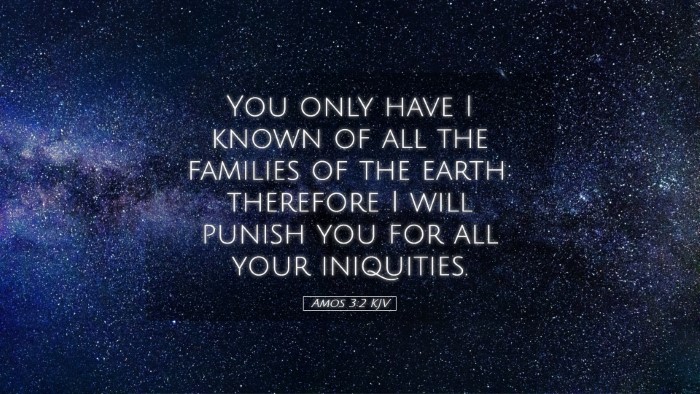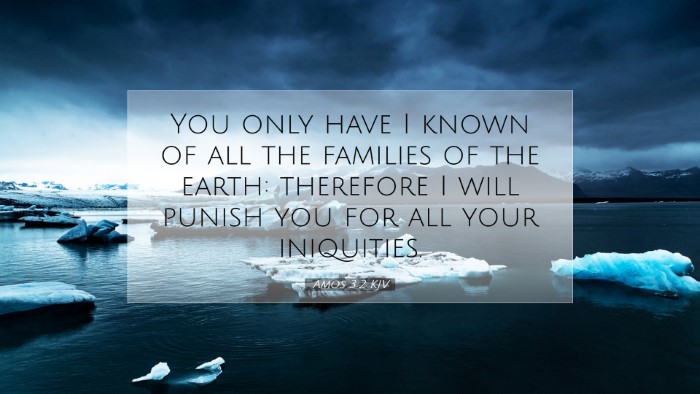Old Testament
Genesis Exodus Leviticus Numbers Deuteronomy Joshua Judges Ruth 1 Samuel 2 Samuel 1 Kings 2 Kings 1 Chronicles 2 Chronicles Ezra Nehemiah Esther Job Psalms Proverbs Ecclesiastes Song of Solomon Isaiah Jeremiah Lamentations Ezekiel Daniel Hosea Joel Amos Obadiah Jonah Micah Nahum Habakkuk Zephaniah Haggai Zechariah MalachiAmos 3:2
Amos 3:2 KJV
You only have I known of all the families of the earth: therefore I will punish you for all your iniquities.
Amos 3:2 Bible Commentary
Commentary on Amos 3:2
Verse Reference: Amos 3:2 - "You only have I known of all the families of the earth: therefore I will punish you for all your iniquities."
Introduction
The Book of Amos, one of the Minor Prophets, conveys profound truths about God's relationship with His people, particularly in the context of judgment and accountability. Amos 3:2 serves as a crucial verse that articulates the unique covenant relationship God has with Israel and the implications of their disobedience. This commentary synthesizes insights from several public domain commentaries, including those by Matthew Henry, Albert Barnes, and Adam Clarke, to present a thorough understanding of this significant passage.
Contextual Overview
Amos, a shepherd and a farmer from Judah, was called to prophesy against the Northern Kingdom of Israel during a time of relative prosperity, but moral decay and social injustice were rampant. The messages delivered through Amos stressed the sovereignty of God and His expectations of righteousness among His chosen people.
Exegesis of Amos 3:2
The verse begins with a statement of God's selective knowledge of Israel: "You only have I known." This emphasizes the intimacy and distinctiveness of God's relationship with Israel compared to other nations. Albert Barnes notes that God's 'knowing' implies an acknowledgment of accountability; Israel was chosen not merely for favor but for purpose and responsibility.
The subsequent phrase, "therefore I will punish you for all your iniquities," illustrates the seriousness of their actions. Matthew Henry comments that later punishments are a direct consequence of the covenantal relationship that demanded fidelity and righteousness, thus implying increased accountability. The sins of Israel, amplified by their special status as God's people, invoke severe judgment.
Theological Implications
-
Covenantal Relationship:
The concept of being "known" by God is not just about recognition but signifies a covenant relationship filled with commitment and expectation. Adam Clarke highlights that this knowledge signifies a deeper intimacy reserved for the righteous, who are expected to live in accordance with God's laws.
-
Responsibility of Knowledge:
With privilege comes responsibility; hence, this passage underscores a fundamental theological truth — those who are in covenant with God are held to a higher standard. Failure to uphold this standard results in divine judgment, as noted by Barnes. This is a reminder to believers today of the weight of their calling.
-
God's Justice:
God's justice necessitates punishment for iniquity. Henry explains that God’s warning is rooted in His love and justice. It serves both as a reminder of His holiness and as an appeal for repentance. The moral character of God is portrayed consistently in Scripture, always demanding righteousness from those who claim to follow Him.
Practical Applications
-
Awareness of Accountability:
Believers are called to reflect upon their position before God. Just as Israel had a unique calling and responsibility, so too do modern-day followers of Christ understand their significance in the world – to be ambassadors of His kingdom. This necessitates a life that reflects His holiness and righteousness.
-
Understanding God's Discipline:
Disciplinary actions from God are often misinterpreted as abandonment. Henry encourages readers to view them as expressions of His love, designed to correct and restore. Recognizing the nature of God as a loving Father can produce a faithful response to His guidance, leading to spiritual growth.
-
Emphasis on Social Justice:
Amos’s prophecies often tackled issues such as social injustice and exploitation. The verse serves as a reminder for today’s church to reflect on social issues and to embody justice and compassion, aligning behaviors with the knowledge of God's expectations for His people.
Conclusion
Amos 3:2 stands as a solemn reminder of God's unique relationship with His chosen people – a relationship marked by profound love, but also by immense responsibility. It calls forth an understanding of the implications of divine knowledge and the gravity of sin. For pastors, students, theologians, and scholars, this verse compels deep reflection on humility before God, accountability in our actions, and the unwavering commitment to live a life that honors His calling. By appreciating the insights from timeless commentaries, believers can gain a richer understanding of God's Word and its applications to their lives.


